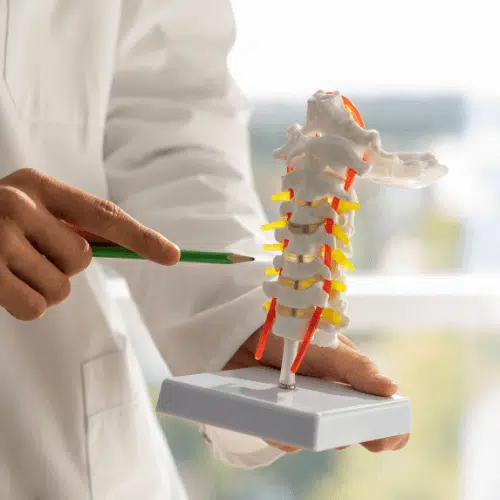Axis Spine And Orthopedics Can Be Fun For Anyone
Axis Spine And Orthopedics Can Be Fun For Anyone
Blog Article
Examine This Report on Axis Spine And Orthopedics
Table of ContentsSee This Report on Axis Spine And OrthopedicsHow Axis Spine And Orthopedics can Save You Time, Stress, and Money.10 Simple Techniques For Axis Spine And OrthopedicsAn Unbiased View of Axis Spine And Orthopedics
An orthopedic specialist is a medical professional who specializes in dealing with problems of the bones, joints, and connective cells, and ensuring you keep a healthy musculoskeletal system., we have extremely qualified orthopedic specialists that are qualified of treating individuals of all ages. I obtained included in study during my initial year of clinical institution, and I began making connections with orthopedic specialists early on.
Follow these guidelines meticulously to avoid complications during the procedure. Review the post-operative care plan with your doctor. Understand what to expect during the healing duration and how much time it will take to resume everyday activities. Set up for transport to and from the healthcare facility on the day of surgery.
The Ultimate Guide To Axis Spine And Orthopedics

Your physician will certainly give lots of details concerning post-operative treatment, consisting of how to stay tidy and maintain the medical area tidy. Complying with these pointers can prepare you physically and mentally for your orthopedic surgical procedure. Remember to preserve a positive overview and count on your medical group's knowledge, adding to a smoother recuperation process.

Otherwise, you'll just get confused. Assume concerning the huge photo. Nobody expects you to know anything, so do not try to memorize a lot of random realities. Whether you're pursuing your youngsters, dealing with hiking routes, or revealing off your finest dancing moves, maintaining your bone and joint system in wonderful form is vital. Otherwise, joint discomfort can truly mess up your life.
The consistent ache in your knee or the tightness in your shoulder can slow you down and make even basic jobs difficult. Usual conditions dealt with by orthopedic doctors are: Cracks and Bone Trauma: Broken bones and other injuries from crashes or effects. Joint inflammation: Especially osteoarthritis, which causes joint pain and tightness. Benign Soft Cells Growths: Non-cancerous growths in muscles or various other soft tissues. Bone Cancer: Lumps in the bones. Bursitis: Inflammation of the small cavities of.
The Facts About Axis Spine And Orthopedics Revealed
liquid that support the bones, ligaments, and muscular tissues near your joints. Neck and Lower Back Discomfort: Problems affecting the spine. Orthopedic Trauma: Serious injuries impacting bones, joints, or soft cells. Sports Injuries: Troubles like tendon tears, tendon injuries, and joint discomfort from athletic tasks.
Strains and Strains: Injuries to ligaments and muscles. Tendinitis: Inflammation of the tendons. Orthopedic specialists carry out a selection of procedures to aid individuals with bone and joint concerns. Usual instances are knee and hip replacements. Joint Reconstruction: Rebuilding a harmed joint to restore its function. Bone Grafting: Taking bone from one part of the body and transplanting it to another area to fix and reconstruct harmed bones. Reconnecting Nerves: Repairing damaged nerves to restore motion and sensation. Back Disk Substitute: Changing a harmed spinal disk with a fabricated one to alleviate pain and recover feature. You'll require to take and pass the Medical University Admission Examination( MCAT). This standardized test assesses your understanding and skills necessary for success in clinical institution. Medical school is an extreme

The Only Guide to Axis Spine And Orthopedics
Next, they finish an orthopedic residency. It's generally five years and gives hands-on discovering in a medical setup. Limited motion due to discomfort. Tightness. First appointments often consist of: Reviewing your symptoms, clinical history and way of life. A physical examination, consisting of moving the influenced joint in certain ways. Imaging researches, such as an X-ray. Explanation of your medical diagnosis.
Treatment recommendations. Some conditions need extra imaging, like a CT check or MRI for more in-depth views of the uncomfortable location. Your orthopedist will recommend treatments to reduce signs till you receive a medical diagnosis. Orthopedic specialists specialize in nonsurgical and surgical methods. For particular sorts of orthopedic injury or genetic conditions, surgical treatment is often the initial line of treatment. For many various other problems, orthopedists attempt nonsurgical treatments. It may take even more than one kind of treatment to attain lasting alleviation. Choosing the right is vital for effective medical outcomes and enhanced patient recovery. With a broad range of options offered out there, it can be frustrating for both surgeons and patients to make an informed decision. The top five factors to take into consideration when picking an orthopedic implant are medical compatibility, cost-effectiveness, factors to consider for alteration surgical treatment, patient-specific variables, and the style and advancement of the implant. They are available in numerous shapes, sizes, and products, each offering a specific purpose based upon the person's needs. Understanding the basics of orthopedic implants is essential before diving right into the decision-making process. One of the leading considerations when choosing an orthopedic dental implant is its compatibility with the medical procedure. Different implants are developed for various medical strategies and techniques. The orthopedic dental implant need to be especially developed to fit the patient's makeup and make certain security throughout the recovery process. Surgical compatibility entails aspects such as dental implant size, form, and material. The success of orthopedic treatments counts greatly on the proper option and placement of implants that work with the person's makeup and case history. By focusing on patient security and wellness, orthopedic surgeons can accomplish successful results and supply the greatest top quality of treatment to their individuals. Surgeons should thoroughly consider the biomechanical residential properties of the implant and exactly how it will certainly integrate with the person's bone structure. This will certainly add to much better medical results, lowered problems, and shorter healing time. When selecting implants for a person, it is vital to consider a variety of patient-specific aspects that can influence the success and result of the treatment. These factors include the person's age, bone high quality and amount, oral wellness standing, medical background, lifestyle practices, and aesthetic preferences. For older individuals with endangered bone thickness, shorter implants or implanting treatments might be useful to provide the necessary stability and assistance. 3. Is the dimension of the orthopedic dental implant an essential factor to consider? Exactly how does it influence the surgery and the patient's healing? Yes, the size of the implant is vital as it has to match the person's framework for correct fit and capability. 4. Can the individual's age and lifestyle contribute in choosing the most suitable orthopedic implant? Absolutely. How does the cost of an orthopedic dental implant variable right into the decision-making procedure, and exist methods to balance quality with affordability? The cost of the implant is an important consideration, but it should not be the single determining variable. Stabilizing high quality with cost entails evaluating different implant alternatives 'lasting advantages and prospective complications. Report this page